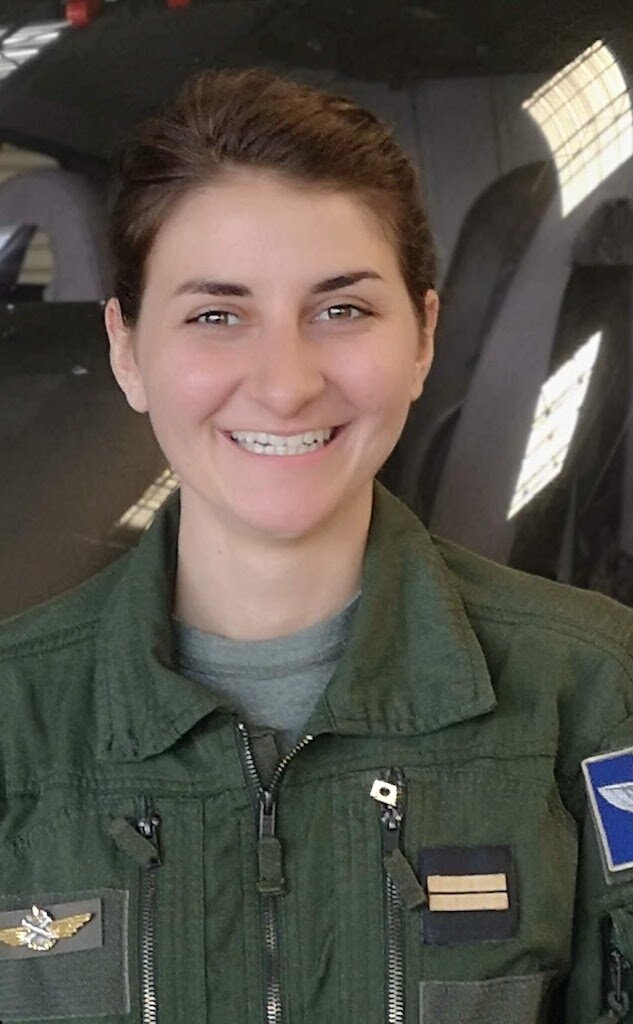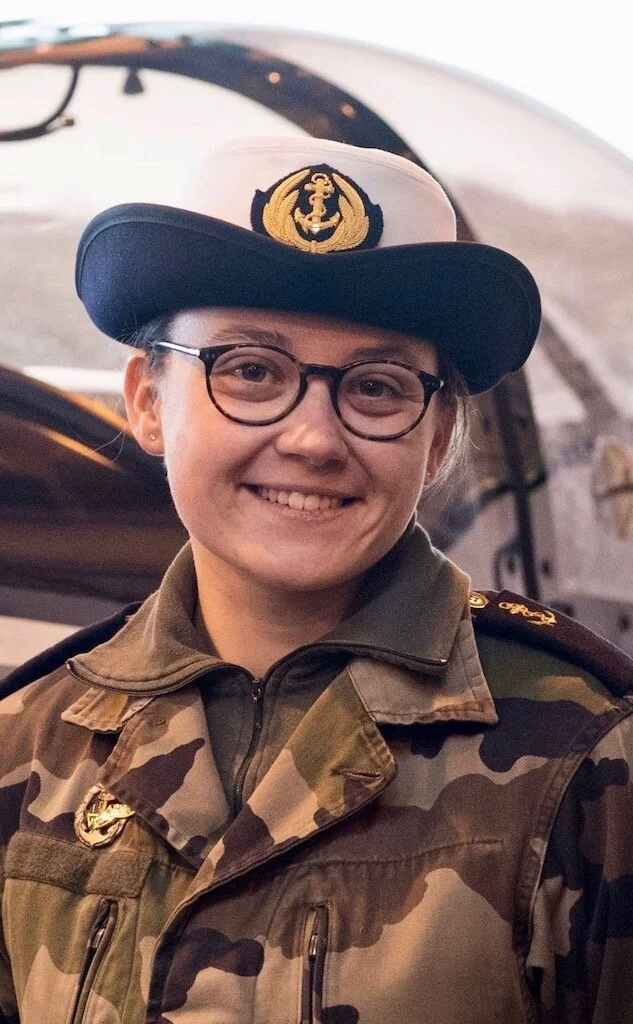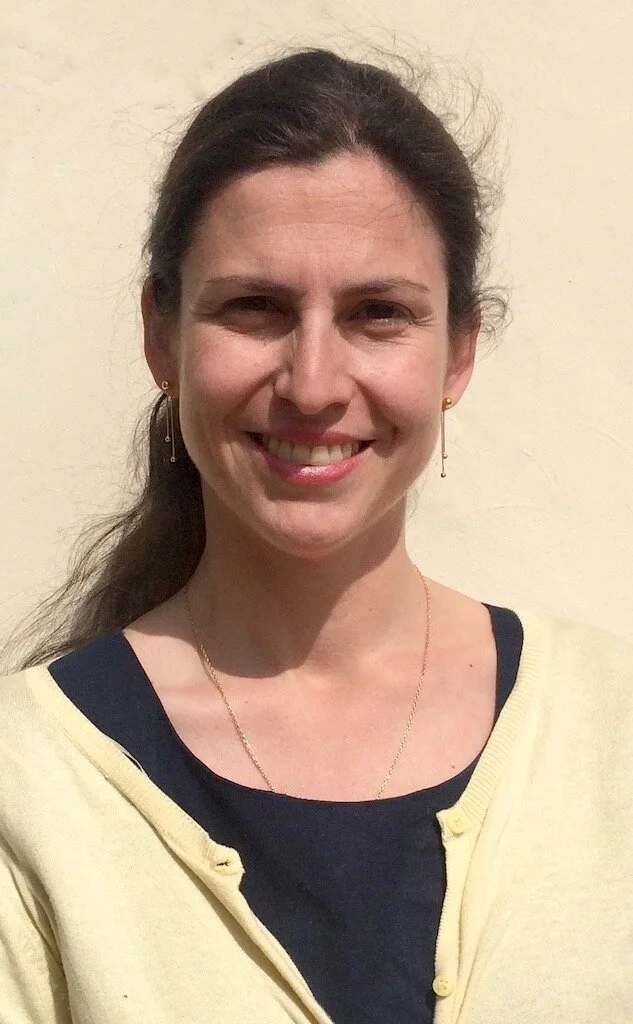Sub-Lieutenant Hélène
Sub-Lt. Hélène. Photo credit: personal photo
Sub-Lieutenant Hélène is at the cusp of a career as a helicopter pilot in the French Navy. She should be fully qualified and a lieutenant by this summer, although, like almost everybody else in France right now, she is confined and not attending any more training sessions for the time being. She was outdoors as we spoke via FaceTime on a lovely spring day, her voice sometimes drowned by the twittering of the birds!
Hélène is the third generation of her family to join the military. Her grandfather was a legionnaire, her father in the Air Force, one of her brothers was in the Army, another in the police force. But she is the first to join the Navy. It was a fairly natural choice. Following her father's deployments, she was brought up in Corsica, Nice and in Guadeloupe, all places where the sea is omnipresent. But it was also the challenge of landing an aircraft on a ship that attracted her. “A naval pilot is more multi-skilled in terms of piloting,” she explains “and there is far less room for error landing on a ship than landing on the ground.”
““When you get your sword at the passing-out ceremony you know that you might be giving your life up for it””
She doesn't yet know what helicopter she will be flying but has already filed her list of choices. The Navy makes the final decision based on performance during training. “I'd like to fly the single-pilot NH90 Caïman out of Hyères [between Marseilles and Nice on the Mediterranean coast] even though this helicopter is not yet available for young pilots. But hopefully by this summer it will be,” she says. The Caïman is a medium-sized, twin-engine aircraft whose naval version is crewed by one pilot and one tactical coordinator. Her second choice is also the Caïman but out of Lanvéoc in Brittany, where she is currently based, which is about as far west as you can be in France! Her third choice is on the medium-sized Panther, also out of Hyères. This aircraft has two pilots and is much older than the Caïman.
Hélène is a career naval officer so she is likely to be flying helicopters for a dozen or so years after which she will be given a command post. “I'd like to command a frigate,” she says dreamily.
She went to a military secondary school and passed a scientific baccalaureate. “I then spent two years studying higher maths and special maths to prepare the competitive entrance exam for the Ecole Naval (Naval College). There were 80 of us in my intake, of which four women. And only two of us wanted to be pilots. The other girl failed the pilot selection test.” So amongst the nine naval pilots being trained this year (three each for helicopters, combat aircraft, maritime patrol aircraft), Hélène is the only female. “The others are easy to work with,” she laughs. But she is still puzzled by a comment made by a military doctor who told her during the psychology tests that he didn't want women as combat pilots. “I'm not sure whether his comment was part of the psychology test or whether he really meant it,” she muses. In either case, it's the only comment about her gender she's heard to date.
Sub-Lt. Hélène at the commands. Photo credit: personal photo
Flying a helicopter “is more technical and requires greater precision” than flying an aircraft according to Hélène. So what qualities d'you need, I ask? “You have to be able to do several things at once and prioritise them, in other words be highly versatile,” she answers. And this ability is what they test in candidates applying for the piloting course. Sitting in a flight simulator, the candidate must follow a given heading (a direction, in other words) and maintain a given altitude – both of which change regularly during the test – and at the same time do some mental arithmetic, remember a set of images and be able to retain, in the right order, a series of numbers. “You mustn't assume that you won't manage but go ahead and try,” she says.
Those who pass go to the French Army's helicopter pilot school in Dax (south of France) where all the French armed forces' helicopter pilots are trained. “What impressed me was that after about 12 hours or so (8 flights) with the instructor, he suddenly got out of the aircraft and said 'now fly this by yourself around the airfield'. I was confident and excited but also realised that I was on my own and there was no margin at all for any errors! But everybody manages very well.”
Hélène is very aware that the career parth she has chosen could cost her her life. “We talk about it a lot at the Naval College. There is a lot of discussion about self-sacrifice so that everyone is perfectly conscious of what that entails and those who can't accept it, leave. When you get your sword at the passing-out ceremony you know that you might be giving your life up for it,” she says thoughtfully. But she has clearly accepted that.
Sub-Lt. Hélène flying the Dauphin helicopter. Photo credit: personal photo






